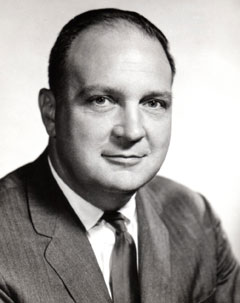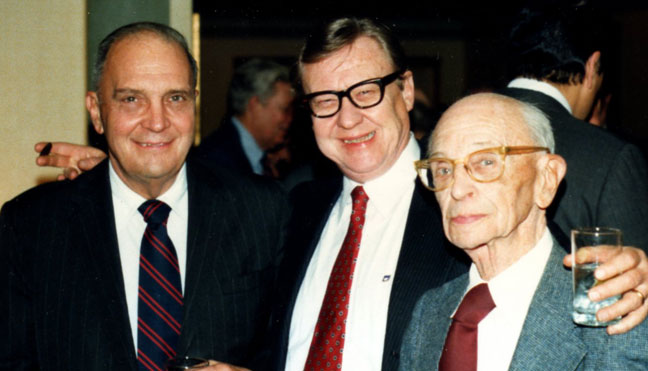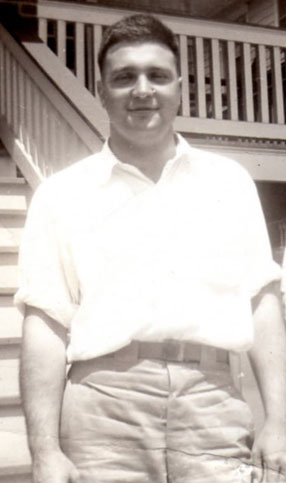
Fairbairn Gilkeson, who was honored with The True Gentleman award on June 11, 2005, left a legacy beyond his personal contributions to New York Alpha. One of his two sons, Bob, had a very distinguished career while sending three sons and his daughter through Cornell. His other son, Jack, a Bucknell SAE brother, gave his life for his country when his submarine, the Albacore was lost in the Sea of Japan during WWII.
Bob Gilkeson, born to Fairbairn and his wife Helen in 1917, was a product of the Depression, and held several jobs from shining shoes on the boardwalk in Atlantic City to playing trumpet in a jazz band to finance his education at Cornell. He had several lifelong friends who were brothers, most notably Carson Cornbrooks, with whom he communicated and visited regularly over the years after graduation in 1939, and until Bob died in 1993 at the age of 75.
He loved taking things apart to find out how they worked and used to reminisce about the days he converted Indian motorcycle engines for use in light airplanes. He was particularly proud of having kept his wedding toaster alive and well for over 40 years.
Bob often talked about how much he enjoyed being the house manager at Hillcrest, and credited the experience with motivating him to do much of the construction himself on the house in Wayne, Pennsylvania, where he raised his family.
This interest extended to radios and other early electrical devices, and no one was surprised when he chose to study electrical engineering. After Cornell, he was hired as a cadet by the Philadelphia Electric Company (PECO). When Uncle Sam intervened, he served as a U.S. Army officer in WWII, spending most of his time, as he explained it, eating powdered eggs and watching the sea turtles lay eggs of their own on a top secret mission on remote Ascension Island in the Atlantic.
After returning to PECO, Bob moved beyond climbing utility poles and started his ascent through the ranks. In 1951 he packed up the family and was granted a leave of absence to work for Westinghouse near Idaho Falls, Idaho, where he was interviewed and cleared by Admiral Hyman Rickover to help with the development of the prototype propulsion system for the world’s first nuclear naval vessel, the submarine Nautilus. PECO was about to enter the nuclear power plant age, and the guy who liked to know all about how things worked was chosen to learn as much as he could.
When he returned to PECO in 1953, he was given increasingly greater responsibilities. His curiosity and inventiveness resulted in a few patents and several contributions to the use of very high steam conditions in Electric generation when he served as the superintendent of Eddystone, one of the nation’s earliest supercritical steam electric generating stations, in the late 1950’s. Elected a Vice President in 1961, he was promoted and made a member of the Board of Directors in 1962, President in 1965, CEO in 1970 and CEO and Chairman of the Board in 1971. He served as Chairman until his retirement in 1982 but continued on as chairman of the executive committee until 1988.

Along the way, his Idaho experience allowed him to contribute significantly in the development of a very early nuclear reactor prototype plant and then several commercial nuclear plants for PECO. He founded Radiation Management Corporation in 1968. This medical service, which prepared and trained nuclear plant personnel and local hospitals to deal with radiation injuries, continues to serve utility companies throughout the United States.
His leadership was recognized with his election to chairman of the Edison Electric Institute in 1977, the National Academy of Engineering in 1978, and his nomination by President Reagan and confirmation by the U.S. Senate to serve on the National Science Foundation Board in 1982. He also served on several boards that influenced the development of Philadelphia and its regional economic interests. Along the way, he served as general chairman for the greater Philadelphia United Fund Torch Drive and was presented the Poor Richard Club’s gold medal for his contributions to both industry and civic leadership.

Like his father, Gilk, Bob Gilkeson served as a trustee for the Williamson Free School of Mechanical Trades and the Northern Home for Children in an effort to give back to the community. He also regularly traveled to Ithaca to help advise the Cornell engineering school regarding their development plans. He was active with the Cornell Club of Philadelphia and would often speak to prospective students.
Also, like Gilk, he was a very modest man. He much preferred just getting the job done, and hated the regular trips he was forced to make to Washington D.C. to defend the nuclear industry. When he was forced to modify his home phone to keep the opponents of nuclear power from screaming at him at home at all hours of the night, he often wished he had just been able to be an engineer and devote his career to the nuts and bolts of power generation. At the height of his career he refused to give himself a raise for several years in order to let his attackers know that his motivation for guiding his company into the nuclear age was not to line his pockets. When he was named an executive and given his choice of cars for travel to and from the office, he passed up the black Caddies and Lincolns on the lot and chose instead to be driven in a non-descript gray Rambler American. Gilk, who always drove VW bugs, must have enjoyed that!
Bob remarked at one time that the reason he pursued a management track rather than just sticking to engineering, his true love, was that he just hated working for people who knew less about what was going on than he did, and the best way to deal with this was to become their boss. He was his own man, and delighted in not simply following the latest management fads. Despite advice to have his secretary screen all his calls to save him time, he insisted on answering his office phone personally even when he was the CEO.
Bob absolutely hated dealing with employees who hadn’t done their homework. When PECO became computerized in the 1980’s, an Information Systems manager insisted there was no way he could format a computer report in the way Bob wanted to see it. Rather than spend a lot of time arguing, Bob simply bought a prototype Sinclair computer and produced a report formatted the way he had requested it and called the man back into his office. Along the way he took the machine apart to see how it had been built and constructed a new one from parts he found at Radio Shack. And the software program he used? Well, it was fortran – self taught, of course.
He hated not knowing what was going on, and grew increasingly upset when the early I. S. Managers, in particular, wanted large budgets but couldn’t explain to him in detail how all the money was to be spent. He suggested that the I.S. department put together classes to educate the employees and managers about the capabilities of the machines, and of course, was the first to sign up and attend, even though he was the top executive.
As his sons Dick, Tom, and Dave were considering college and fraternity choices, their dad made their decisions fairly simple. He would say, “You can go to any school you want, and pledge any fraternity you want, but I’ll pay the bills at Cornell and SAE.” None of the boys ever tried to find out if he was serious.

